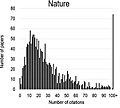Nature (journal) facts for kids
Nature is a very famous science magazine. It was first published a long time ago, on November 4, 1869. It's known all over the world because scientists often mention it in their own research papers. This means when scientists write about their experiments, they often refer to studies they read in Nature more than any other magazine. It's also the science magazine that has been published every week for the longest time without stopping!
Most science magazines today focus on just one type of science, like only chemistry or only space. But Nature is different! It still publishes exciting new discoveries and original research from all kinds of science fields. Important new discoveries and original scientific studies are printed as articles or letters in Nature. The magazine also shares summaries and reviews of important research areas.
Scientists who do research are the main readers of Nature. However, everyday people also read it. Because of this, the articles are written and edited so that scientists from other fields and anyone with a good education can understand them.
What Can You Find Inside Nature?
The first few pages of each Nature magazine have special sections. These include editorials, which are like opinion pieces from the editors. There are also news stories and articles about topics that are interesting to scientists. These topics can include current affairs, how science research gets money, business in science, rules for good scientific behavior (called ethics), and big research breakthroughs. You can also find sections about books and art.
Sometimes, the printed articles are shorter summaries of the work. The full details might be found in extra materials on the magazine's website.
More Journals from Nature
Nature has also created a group of more specialized magazines. These magazines publish longer, more technical articles. These articles might be too detailed for Nature's wider group of readers.
Images for kids
See also
 In Spanish: Nature para niños
In Spanish: Nature para niños
 | James Van Der Zee |
 | Alma Thomas |
 | Ellis Wilson |
 | Margaret Taylor-Burroughs |




